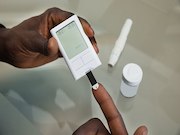Improvement in glycemic control, reduction in body weight, SBP; increase in genital mycotic infections
TUESDAY, Feb. 20, 2018 (HealthDay News) — For adults with inadequately controlled type 2 diabetes, ertugliflozin treatment is associated with improved glycemic control over 52 weeks, according to a study published online Feb. 8 in Diabetes, Obesity and Metabolism.
Ronnie Aronson, M.D., from LMC Diabetes & Endocrinology in Ontario, and colleagues conducted a phase III randomized trial to examine the efficacy and safety of ertugliflozin monotherapy in adults with inadequately controlled type 2 diabetes despite diet and exercise. The study comprised a 26-week placebo-controlled period where 461 participants received placebo or ertugliflozin (5 or 15 mg/day) and a second 26-week period in which participants in the placebo group had blinded metformin added.
The researchers found that the mean change in glycated hemoglobin (HbA1c) from baseline to week 52 was −0.9 and −1 percent in the ertugliflozin 5- and 15-mg groups, respectively; the proportion of patients with HbA1c <7 percent was 25.6 and 28.5 percent, respectively, at week 52. Ertugliflozin was correlated with a reduction in fasting plasma glucose, body weight, and systolic blood pressure. In females, the incidence of genital mycotic infections (GMIs) was significantly higher in both the 5- and 15-mg ertugliflozin groups versus placebo/metformin (26.9 and 29 versus 9.9 percent); males had significantly higher GMI incidence in the 15-mg group (7.8 versus 1.2 percent).
“Ertugliflozin treatment over 52 weeks improved glycemic control and reduced body weight and systolic blood pressure but increased GMIs,” the authors write.
Several authors disclosed financial ties to pharmaceutical companies, including Pfizer and Merck & Co., which funded the study.
Copyright © 2018 HealthDay. All rights reserved.








